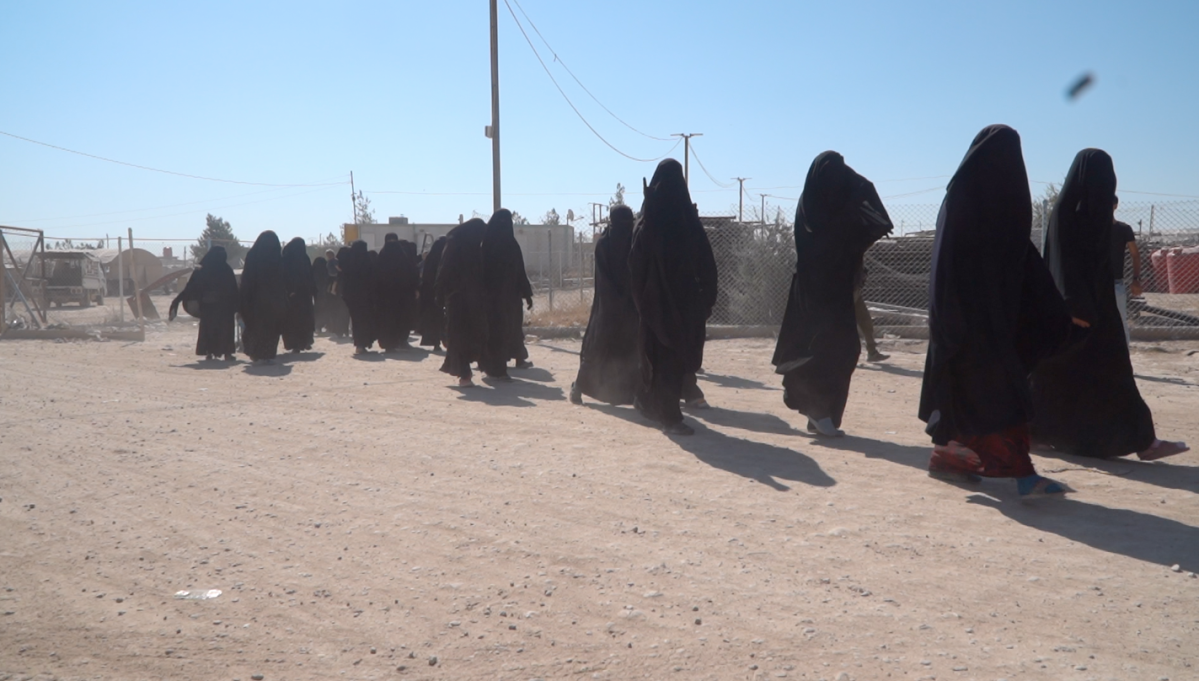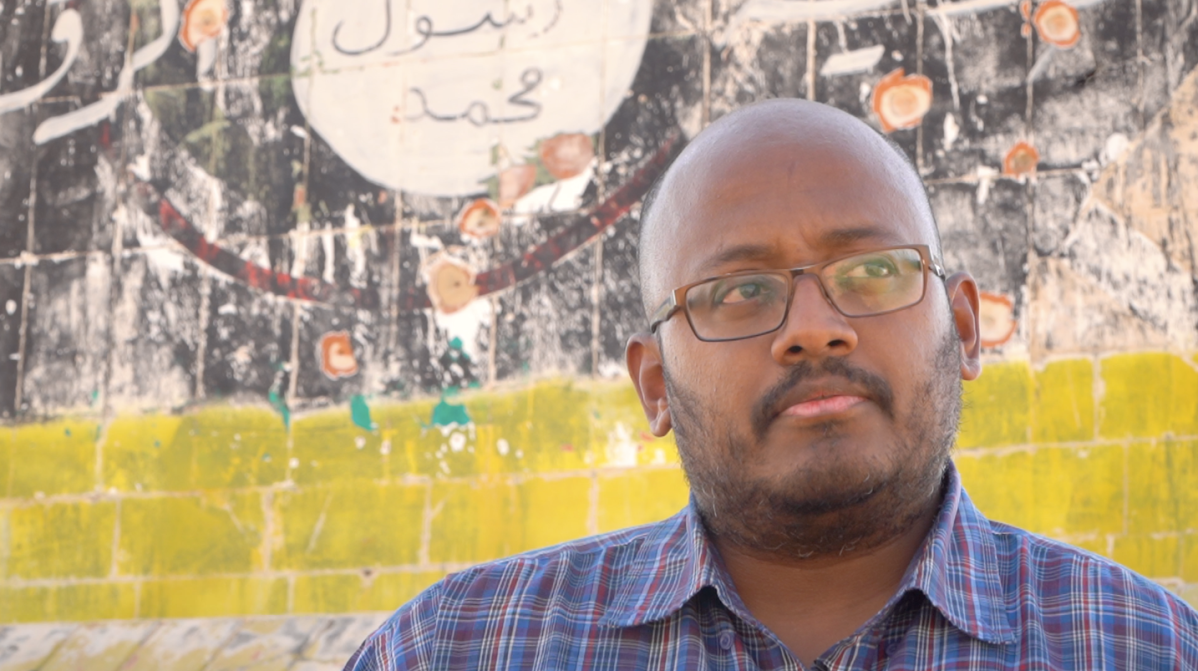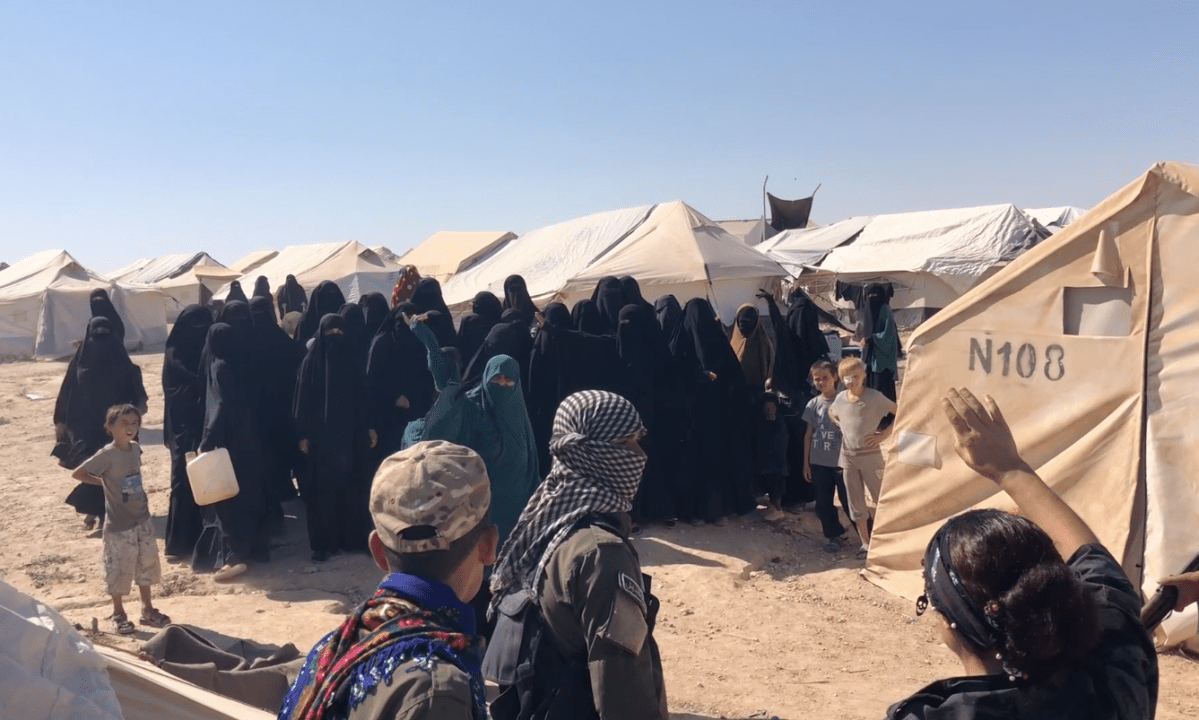The unrest began when hardliners at Syria’s biggest camp for female ISIS detainees gathered in a tent, allegedly to whip a woman as punishment for defying their puritanical code.

Kurdish soldiers arrested those responsible, but as they led the prisoners away, more black-clad women congregated, chanting “God is great,” index fingers jabbing at the hot morning sky.
“Jihad,” one shouted.
“Oppressors,” another said in English.
When the demonstrators wouldn’t disperse, more troops came running. Aiming over the women’s heads, they fired bursts from their rifles. Then two armoured vehicles arrived, blasting rounds from their gun turrets.
By the time the shooting stopped, a woman was dead. Medecins Sans Frontieres said it had treated four more for gunshot wounds, and the security forces lamented the deteriorating conditions at the camp.

A city of white tents behind a security fence, Al-Hawl camp houses more than 70,000 women and children captured during the final battles against ISIS that ended six months ago.
Thousands of them are foreigners that their own countries, including Canada, won’t take back. So the Kurds, having lost 11,000 fighters to defeat ISIS, have been left alone to detain the world’s most unwanted.
It was already an overwhelming responsibility, and now the Kurds have been dragged into a new conflict with NATO ally Turkey, which, following a nod from U.S. President Donald Trump, launched an offensive into northern Syria this week.
Canada denounced the invasion but has not done its part to ease the burden on the Kurds by repatriating any of the roughly 40 Canadians held at ISIS detainee camps, according to Kurdish authorities.

A week before Turkey attacked, Mustafa Bali sat behind his desk at a military base in Ayn Issa, lamenting the Canadian government’s inaction on a critical global national security issue.
“Those Canadian citizens who came here, they came to kill us and they came to kill our kids and to destroy our towns,” said Bali, spokesman for the Syrian Democratic Forces.
“And the moment that we arrested them and had them in our prisons or our camps, we were saving the Canadian people in Canada. We were preventing them from doing any terrorist attacks.
“So doing nothing towards those citizens, that’s really not respectful for the sacrifice that we have done,” Bali said.

The SDF had won a hard-fought peace in northern Syria, having finished off the so-called caliphate and imprisoned roughly 100,000 ISIS fighters and their families.

Get breaking National news
The Turkish offensive ended the calm and brought new urgency to the question of the ISIS captives. Kurdish authorities said in interviews that an attack would force them to pull their troops away from the ISIS prisons and camps to defend the border, raising the risk of escapes.
On Friday, the SDF reported that women at Al-Hawl had started riots in an attempt to escape.
About a dozen and a half Canadians and their two dozen children are detained by the Kurdish forces. That’s not a huge number, but taken together, with every other country that has abandoned its ISIS members to the Kurds, Canada is not helping with its inaction.
During a visit to Syria last week, Global News and two researchers interviewed several Canadian detainees. None had even spoken to any Canadian officials, and Kurdish authorities said Canada had long ago halted talks about bringing them back to Canada.
“The Canadian citizens who are here, they are six men and 12 women and some kids so when we talk about Canada … it’s as big as 10 million metres squared. It’s a very big country compared to our country,” Bali said.
“I’m just surprised how a big country like Canada cannot take six or 12 citizens to their country.”
The world’s seeming disregard for the plight of the Kurds was on full display at Al-Hawl camp, where the SDF has been battling to control ISIS women determined to enforce their stark version of Islamic law on the population.
“The situation is really getting worse,” Bali said.
The women have been encouraged by a recent audio address in which ISIS leader Abu Bakr al-Baghdadi called on his supporters to free the women from what he called the “prisons of humiliation,” officials said.
The ISIS propaganda arm Amaq claimed in a statement that an Oct. 9 attack on SDF positions in Raqqa was a “response to the assault on female prisoners in the camps.”
“They have nothing without all the women and they know that, too,” said Kimberly Polman, a Canadian who was detained at Al-Hawl camp but has since been moved to a different location.
The Canadians and other westerners at Al-Hawl are kept in a foreigners’ annex, the scene of the Sept. 30 shootings, which occurred during a visit by Global News, Prof. Amarnath Amarasingam of Queen’s University and Leah West, a national security law expert at the Norman Paterson School of International Affairs.
Days earlier, a dismembered body was found in a septic tank at Al-Hawl, and the body of a 20-year-old was later found with 16 stab wounds, an official said. A 14-year-old was murdered last month, allegedly for not wearing a niqab. Guards have reportedly been stabbed. Kurds call the camp a “ticking time bomb.”
“I think it was pretty clear from our experience in Al-Hawl that there’s a small subset of women who kind of run the show at the camp, who are very much kind of overpowering a lot of the other women in the camp, policing what they wear, policing what they can say, policing how they act,” Amarasingam said.
Left to fester, it will only get worse, he said, but there is a solution: the four dozen countries with nationals at the camp, including Canada, can evacuate their citizens and bring them home to stand trial for the crimes of ISIS.
The foreign minister for the administration that controls northeast Syria, Abdulkarim Omar, said in an interview that the Canadian government was the first to contact Kurdish authorities about its captured citizens. But since a meeting almost two years ago to discuss the details of repatriation, Canada has halted those discussions without explanation, he said.
“The government is aware of some Canadian citizens currently detained in Syria. There is no legal obligation to facilitate their return,” said Public Safety Minister Ralph Goodale’s spokesman Scott Bardsley.
Former Canadian Security Intelligence Service analyst Jessica Davis said that while it was understandable Canadians would not want the detainees brought home, politics and emotion had clouded policy-making.
“The reality is that these individuals are Canada’s problem, yesterday, today and tomorrow. If they show up at our consulates or embassies, they will be a very real problem.
“If they help to reconstitute the Islamic State, they will be an even bigger one. And if they conduct terrorist attacks and take more lives, that will be on us,” she wrote on Twitter.
With its rows and rows of tents and water tanks, Al-Hawl looks like an endless desert campground, one populated by children.
They are everywhere.
A blond-haired boy with a bandage on his eye. A toddler taking shelter in the shade of a tent flap. A little girl gripping a teddy bear. Women carrying babies and pushing strollers. Even as the women stood together to defy the camp guards, children were at their sides.
“Canada can and should do more to protect the rights of these children, especially those who are Canadians,” said Kathy Vandergrift, chair of the Canadian Coalition for the Rights of Children.
Because so many of the foreign children were born in ISIS-controlled areas, they lack proof of their identity, which has made governments hesitant to take them back.
Security concerns and the lack of domestic programs to rehabilitate and reintegrate children raised under ISIS have also made countries reluctant to repatriate them.
As a result, they have been left in an environment that seems like a factory for producing the next generation of extremists.

“We have those women in our hands, and every day, they are taking care of the kids, how to make them ISIS, how to make them follow ISIS ideology,” said Bali, the SDF spokesman.
The hardline women at Al-Hawl have recreated the ISIS system inside the camp, using religious police called hisbah to enforce their rules, Kurdish officials said.
The fatal shooting last week occurred after camp guards tried to break up a sitting of a hisbah court, they said. Thirty-nine women were put under investigation.
“They take these women because they want to learn Qur’an, that’s it,” a detainee protested in English following the arrests. “We can’t read Qur’an in our tents?”
There were unconfirmed allegations women were armed with handguns.
“It’s craziness here!!!!” a Canadian detainee inside the camp wrote in a message to her family following the shootings. “Please tell Canada we need to leave here ASAP!!!”
Stewart.Bell@globalnews.ca














Comments